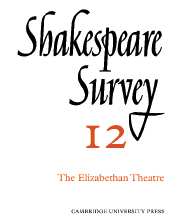Book contents
- Frontmatter
- The Open Stage: Elizabethan or Existentialist?
- The Lantern of Taste
- Was there a Typical Elizabethan Stage?
- On Reconstructing a Practicable Elizabethan Public Playhouse
- The Discovery-space in Shakespeare’s Globe
- ‘Passing over the Stage’
- The Actor at the Foot of Shakespeare’s Platform
- Elizabethan Stage-Practice and the Transmutation of Source Material by the Dramatists
- The Maddermarket Theatre and the Playing of Shakespeare
- Actors and Scholars: A View of Shakespeare in the Modern Theatre
- Cleopatra as Isis
- Shakespeare’s Friends: Hathaways and Burmans at Shottery
- Illustrations of Social Life II: A Butcher and some Social Pests
- International Notes
- Shakespeare Productions in the United Kingdom: 1957
- The Whirligig of Time, A Review of Recent Productions
- The Year's Contributions to Shakespearian Study 1 Critical Studies
- 2 Shakespeare’s Life, Times and Stage
- 3 Textual Studies
- Books Received
- Index
- Plate Section
The Lantern of Taste
Published online by Cambridge University Press: 28 March 2007
- Frontmatter
- The Open Stage: Elizabethan or Existentialist?
- The Lantern of Taste
- Was there a Typical Elizabethan Stage?
- On Reconstructing a Practicable Elizabethan Public Playhouse
- The Discovery-space in Shakespeare’s Globe
- ‘Passing over the Stage’
- The Actor at the Foot of Shakespeare’s Platform
- Elizabethan Stage-Practice and the Transmutation of Source Material by the Dramatists
- The Maddermarket Theatre and the Playing of Shakespeare
- Actors and Scholars: A View of Shakespeare in the Modern Theatre
- Cleopatra as Isis
- Shakespeare’s Friends: Hathaways and Burmans at Shottery
- Illustrations of Social Life II: A Butcher and some Social Pests
- International Notes
- Shakespeare Productions in the United Kingdom: 1957
- The Whirligig of Time, A Review of Recent Productions
- The Year's Contributions to Shakespearian Study 1 Critical Studies
- 2 Shakespeare’s Life, Times and Stage
- 3 Textual Studies
- Books Received
- Index
- Plate Section
Summary
The study of the history of theatrical presentation is very largely a study of the general digestion of cultural tastes. One is faced with, let us say, the ornate scenic operas of the late seventeenth century, or the coarse bravura of Victorian melodrama, or the lean, structural vigour of the Russian theatre of the 1920’s. All these represent schools of taste, now more clearly distinguishable than they were in their own time, exerting and reflecting the influences of social cultures. What is not always so clear is the way in which trends of thought in the field of scholarship or research are themselves affected by these prevailing cultural tastes. The objective facts of historical study lie as it were hidden in a dark place, where students go to search for them, each carrying his own lantern. But each of their lanterns has its own quality, brightness or dullness or particular colour, each illuminates the subject a little differently, and each will give occasion to a different version of the truth. Thus reports given at different periods, or against different backgrounds, will tend, even upon identical material, to vary, sometimes widely, in accordance with influences of taste of which the scholar concerned may not even have been aware. This is particularly the case in such a work as the reconstruction of Elizabethan playhouses, since, as is well known, the hard facts available are insufficient in themselves, and the subject by its very nature is particularly rich in appeal to the imagination. Reconstruction txus tends to become a work of artistic creation on its own, and the beams of the various Lanterns of Taste flash like will-o’-the-wisps in the happy dark.
- Type
- Chapter
- Information
- Shakespeare Survey , pp. 8 - 14Publisher: Cambridge University PressPrint publication year: 1959



